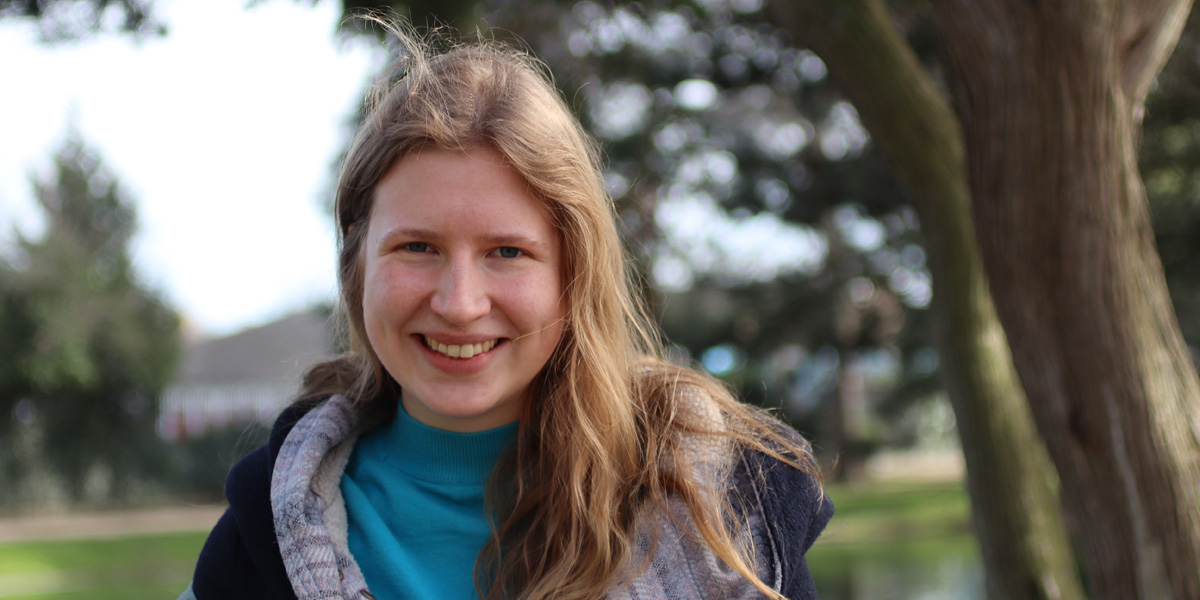Hannah Fuchs
The MD-PhD candidate in Xin Lu’s lab at Ludwig Oxford chats with us about her life, research and other matters.
Tell us a bit about yourself.
I’m originally from Germany, I grew up in Düsseldorf. I learned English in school, but I was never particularly set on leaving Germany. After school I was really torn between whether to do a science degree or study medicine. Then I came across the medicine course in Oxford, which is quite science heavy. You get to do a research project in your undergrad—I’d never heard of that anywhere in Germany. So I did the first four years of med school and then I took a break from that. I’ve done all of my preclinical training and I’ve done my first year of my clinical training as well. Then I’m going back to medical school this July. I’m just writing my thesis now.
I feel very fortunate that I’ve been able to do it in this order because I’d always dreamed of doing a PhD way later down the line, but I didn’t realize that was something I could do in med school. I’ve found it really beneficial, especially working on a fairly clinical project. Even though I hadn’t spent that much time in the hospital, it’s given me a real appreciation of how clinical day-to-day life works and what practical struggles there might be running trials from a clinical side.
What is the focus of your research?
I work on the checkpoint inhibitor esophageal cancer trial—that’s the LUD2015-005 trial. I am investigating what sort of immune cells are present in the cancer and how that determines whether patients, and which patients, respond to treatment. I’ve worked on two big things. I’ve tried to understand the role of B cells and antibodies in the tumor microenvironment. The other project I’ve worked on involves bulk RNA sequencing and single cell sequencing on tissue samples from patients from the operable cohorts of the trial who have also received immunotherapy. We’re trying to understand whether any immune cells correlate with a good outcome or a poor outcome for patients.
What fascinates you about that question?
I think it’s the promise of treatment, especially for esophageal cancer. So many cancers that are being treated with checkpoint inhibitors have had dismal prognoses in the past. There’s great interest in trying to help more patients benefit from this treatment because, at the moment, the response rates are still quite low. From a scientific perspective, I find it absolutely fascinating that, using computational techniques, you can look into a cancer. It’s just really exciting to me.
Do you feel like your clinical background brings something a little different?
I think appreciating how fortunate we are to be able to work on these trial samples. Behind every sample is a whole patient, is a whole person. I’m not sure that’s always helpful to remember because that makes the work maybe even more stressful than it already is, but I think it’s also important to remember what it is we’re working on.
Where is that research heading?
Checkpoint inhibitors have only been approved in the context of esophageal cancer since 2021. For many cancers that is still a very new thing and not as much part of clinical practice as many other treatments. I think the exciting new development is being able to better understand what underlies the response to the treatment and being able to combine it with other treatments. There’s loads of interesting work coming out of combining that with other approaches across cancers and understanding the basic science behind how these treatments synergize so we can use them in a sensible way.
What country would you most like to visit?
My hometown has quite a large Japanese population. I got to learn Japanese in school, and we have quite a lot of local Japanese culture in my hometown. I think it would be fantastic to visit Japan.
Is there something you think we could do better in the science world?
I don’t really blame this on science, but I feel like a big issue is the question of access. I’ve been very lucky in my life. I’ve been given great opportunities. But there are many people who never get these opportunities. Widening access to higher education, especially on a graduate level, is something I think should be a big focus. Science is missing out on many great talents who just don’t have the opportunities to pursue higher education. It’s a loss for everyone.
